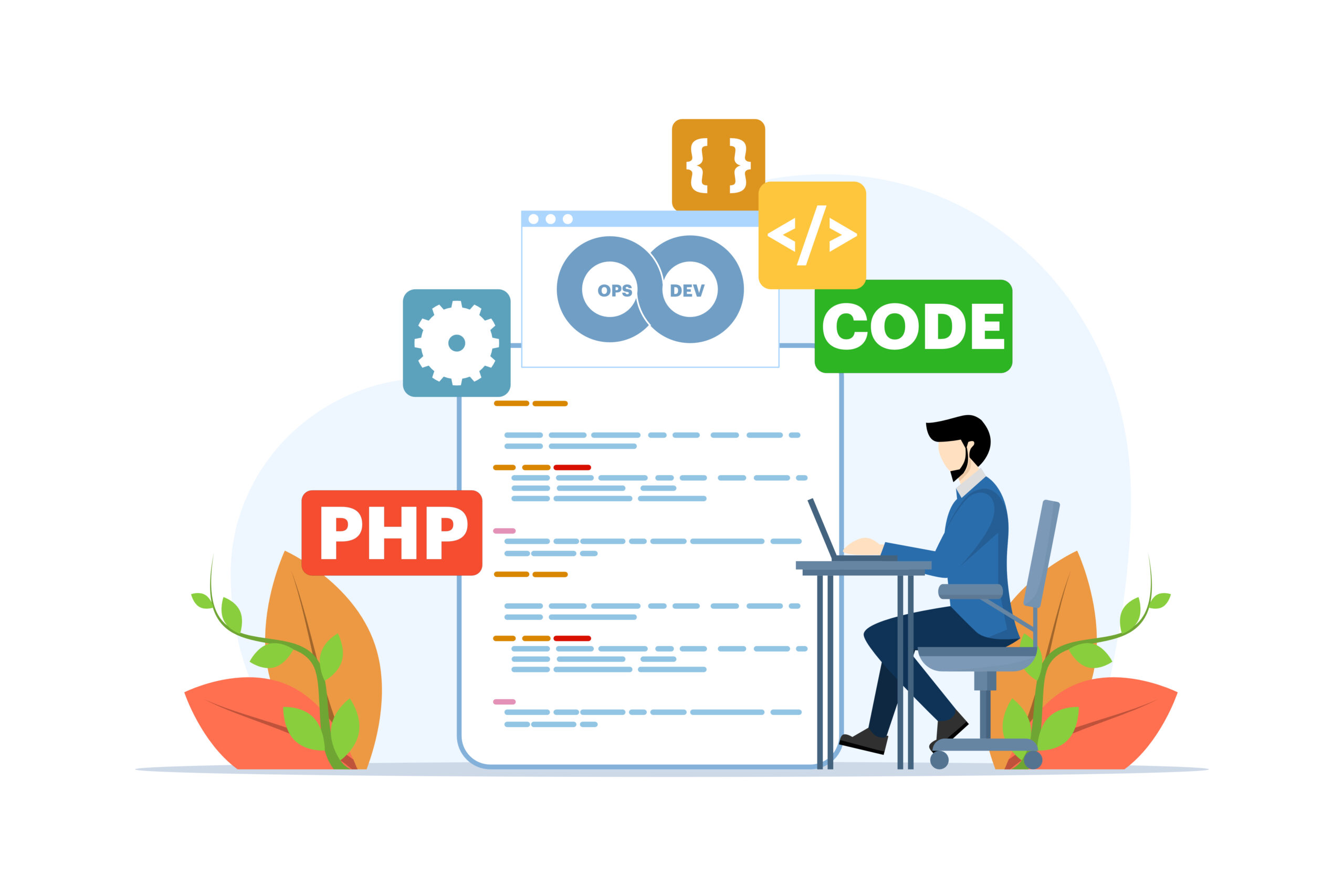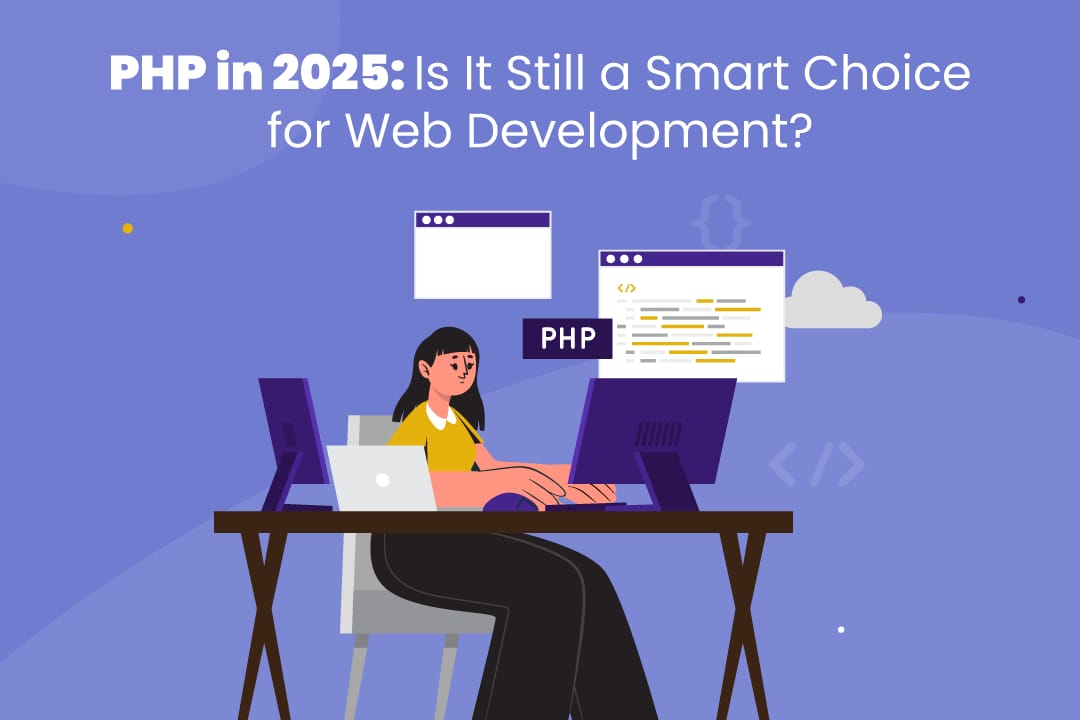PHP in 2025: Is It Still a Smart Choice for Web Development?
- 1 What is PHP?
- 1.1 Key Features:
- 2 Why Was PHP Popular?
- 3 PHP’s Current State in 2025
- 4 Comparing PHP with Other Technologies
- 4.1 PHP vs. Node.js
- 4.2 PHP vs. JavaScript
- 4.3 PHP vs. GO
- 4.4 PHP vs. ASP.NET Core
- 4.5 PHP vs. Python
- 5 Challenges with PHP in 2025
- 6 Is PHP Still a Smart Choice for Web Development?
- 7 The Future of PHP
- 8 PHP Best Practices to Follow
- 9 Final Words
PHP has been one of web development’s most widely used languages for many years. It is the backbone of various websites and applications, from blogs to complex e-commerce platforms. However, as newer technologies are coming, there’s a growing question: is PHP still relevant in 2025?
In this blog, we will explore why PHP is still a strong contender in the web development world. We’ll look at its benefits, new updates, and why it remains popular for building dynamic, reliable websites. Whether you’re considering PHP for your next project or planning to hire PHP developers, this blog will help you understand why PHP continues to be a smart and practical option.
What is PHP?
PHP (Hypertext Preprocessor) is a widely used, open-source scripting language that helps create dynamic websites. It runs on the server and is used to manage content, databases, and user sessions.
Key Features:
- Server-Side: PHP runs on the server and sends the results to the browser.
- Database Support: Works well with databases like MySQL to store and retrieve data.
- Cross-Platform: Works on different operating systems like Windows, Linux, and macOS.
- Open Source: Free to use with a large community for support.
- Dynamic Pages: Creates web pages that update and change based on user input.
Why Was PHP Popular?
Several things contribute to the popularity of this language. Here are the ones:
- Ease of Use: PHP is simple to learn and use. So, developers, even beginners prefer it over other languages.
- Fast Development: It allowed for quick PHP development. So. when it comes to building dynamic websites quickly, PHP is one of the prime options to consider.
- Database Integration: PHP easily connects with databases like MySQL. This makes it ideal for creating data-driven websites.
- PHP Frameworks: Frameworks like Laravel and Symfony provide useful tools for developers. They simplify development, making it faster and more efficient.
- Large Community: PHP has a strong community of developers behind it. This, along with various free resources, makes it widely used.
- Affordable Hosting: Most hosting providers supported PHP. This made it easy to deploy websites without high costs.
PHP’s Current State in 2025

PHP’s most recent version, PHP 8.x, brings many improvements that make it faster, more flexible, and easier to use for web development. It focuses on enhancing performance, adding modern features, and improving the overall developer experience.
Key Updates and Features:
- JIT (Just-In-Time) Compilation: PHP 8.x introduces JIT to improve performance by compiling code into machine language at runtime. This results in faster execution of complex tasks.
- Named Arguments: You can now pass arguments by name instead of position. It makes your code clearer and easier to manage.
- Attributes (Annotations): PHP 8.x supports attributes, letting you add metadata to classes, functions, or methods. This makes code simpler and more organized.
- Match Expression: A cleaner and more flexible alternative to the ‘switch’ statement. It will improve how you handle conditions.
- Union Types: It allows you to specify multiple types for function arguments and return values. This offers more flexibility and safety in your code.
- Constructor Property Promotion: It reduces the amount of code by declaring and initializing properties together in the constructor.
- Enhanced Error Handling: Better error handling and exception management make debugging much easier in PHP 8.x.
- Fibers: It supports asynchronous programming, allowing tasks to run at the same time. This helps boost performance.
- New String and Array Functions: PHP 8.x introduces new functions for handling strings and arrays. These updates make the tasks faster and simpler.
PHP 8.x continues to be a strong choice for web development, offering speed, flexibility, and easier coding in 2025 and beyond.
Comparing PHP with Other Technologies
PHP has been widely used for web development, but there are several other technologies that offer different advantages. Here’s a simplified comparison:
PHP vs. Node.js
- PHP is simple and great for traditional websites and content management systems like WordPress.
- Node.js is better for real-time apps and handling many requests at once. It’s faster for such tasks.
PHP vs. JavaScript
- JavaScript works on both the client and server sides (using Node.js).
- PHP is server-side only, mainly for creating dynamic web content.
PHP vs. GO
- GO (Golang) is great for handling lots of users and running tasks at the same time.
- PHP is simpler and better suited for websites with content like blogs or small apps.
PHP vs. ASP.NET Core
- ASP.NET Core is strong for large, complex web applications and performs very well.
- PHP is easier to set up for smaller websites and is cheaper to host.
PHP vs. Python
- Python is simple and popular for web development and other fields like data science and AI.
- PHP is focused on building dynamic websites and is still the go-to choice for content-driven websites.
Challenges with PHP in 2025
PHP still faces some challenges in 2025, even though it’s widely used:
- Security Issues: PHP has security concerns, especially with older versions. Keeping PHP updated and following best practices is crucial for mitigating PHP vulnerabilities and keeping your app secure.
- Performance Limitations: While PHP 8.x is faster, it can still struggle with handling high traffic or complex tasks compared to other technologies like Node.js or GO. You may need to optimize your setup for better performance.
- Old Reputation: PHP sometimes has a bad image, with some developers seeing it as outdated. This can make it harder for you to find skilled PHP developers for more modern projects.
- Scalability Problems: PHP works well for smaller sites, but as your website grows, it may face issues with handling more complex features like real-time data.
- Missing Modern Features: Some developers feel PHP lacks the modern features available in newer languages like Python or JavaScript, especially for projects involving AI or machine learning.
Is PHP Still a Smart Choice for Web Development?
Yes, PHP is still a great choice for web development in 2025, especially for dynamic websites and applications. Here’s why:
- Strong Ecosystem: PHP web development is supported by frameworks like Laravel and Symfony, making it easier and faster to build websites. The large community also offers lots of help and resources.
- Affordable Hosting: PHP works with almost all hosting providers, making it easy to set up and cost-effective for businesses.
- Great for Content Websites: PHP is perfect for content-heavy sites, like blogs or CMS platforms (e.g., WordPress). It’s easy to manage and display dynamic content.
- Wide Compatibility with Web Services: PHP integrates easily with a wide range of APIs and web services, helping you extend your website’s functionality quickly.
- Long-Term Stability: PHP is a well-established language that continues to be supported and updated, ensuring it remains a stable choice for long-term projects.
The Future of PHP
PHP continues to be a key part of web development, and here’s what to expect going forward:
- Strong in Business Websites: PHP remains essential for many large businesses. Its long history and wide use in existing systems mean it will continue to be a reliable choice for enterprise-level websites.
- Focus on Specific Uses: While PHP may not be suitable for all projects, it is great for API development, microservices, and cloud-based apps. Its simplicity makes it a strong option for these tasks.
- Improved Speed and Security: PHP is getting faster with updates like JIT and better caching. PHP security is also improving with stronger protection against vulnerabilities, making websites and applications safer.
- Better Tools for Developers: New tools, like AI-powered code helpers, will make developing with PHP easier and faster. Specialized tools will help developers write better code with less effort.
PHP Best Practices to Follow
To make sure your PHP code is clean, secure, and efficient, here are some best practices to keep in mind:
- Write Clean, Readable Code: Keep your code simple and easy to read. Use meaningful variable names and write comments where necessary to explain your code.
- Follow PSR Standards: Follow PHP-FIG standards like PSR-1 and PSR-2 for coding style consistency. This ensures your code is easy for others to understand and work with.
- Use Prepared Statements: Always use prepared statements for database queries to avoid SQL injection attacks and ensure data security.
- Sanitize User Input: Never trust user input. Sanitize and validate it before using it in your application to prevent malicious attacks.
- Use Autoloading: Instead of manually including files, use autoloading to automatically load your PHP classes, making your code more efficient.
- Keep Your PHP Version Updated: Ensure you are using the latest stable PHP version. New updates often come with security fixes and performance improvements.
- Error Handling: Use proper error handling mechanisms to catch and manage errors. Avoid displaying errors to end users and log them securely.
- Optimize Performance: Use caching, optimize database queries, and minimize file includes to improve performance and reduce load times.
Final Words
PHP is still a solid choice for web development in 2025. It’s easy to use, cost-effective, and keeps improving with each update. While new technologies are emerging, PHP remains a great option for building dynamic websites and handling everyday web tasks. If you’re looking for a reliable and well-supported language, PHP is still a smart pick.

















